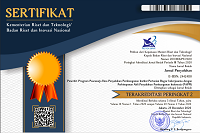Faktor-faktor yang Memengaruhi Keberdayaan Anggota UPPKS DKI Jakarta menuju Kemandirian Usaha
Abstract
Poverty is a major and complex problem, various efforts are made to alleviate poverty, but poverty rates do not decrease significantly, due to the low quality of human resources, which causes limited ability to improve welfare. Improving family welfare through UPPKS is a real contribution, and as a driving force for micro businesses in the community. So it needs to be maintained and developed, because it is a place of creativity to be independent and able to work creatively. The study aims to analyze the factors that influence the empowerment of UPPKS members. Data collection was conducted through interviews with 192 UPPKS members. Data analysis in this study included: (1) descriptive analysis in the form of frequency distribution with the help of SPSS and (2) PLS-SEM. The results showed that this hypothesis was tested by comparing tcount values and t-tables for each variable. The t-count value is greater than t-table (1.96) at the 0.05 level. The results of testing the hypothesis indicate that the factors that influence the empowerment of members are the characteristics of members (X1), the empowerment process (X2), the role of members (X3), and the support of the socio-cultural environment (X4). The empowerment of members is more dominantly influenced by the empowerment process (X2) of 0.427. Positive influences indicate that the higher the characteristics of members, the empowerment process, and the support of the socio-cultural environment, the more empowerment will be. Negative influence is that the higher the role of the group, the lower the empowerment of the member. The empowerment of members significantly influences business independence by 0.354, meaning that the higher the empowerment of members, the greater the independence of the business.
Downloads
References
Ghozali, I. 2008. Model persamaan structural, Konsep & Aplikasinya dengan program Amos 16.0. Semarang. Badan Penerbit. UNDIP.
Hardinsyah dan Ujang Sumarwan. 1997. Pemberdayaan Ekonomi Keluarga. Makalah disampaikan pada Seminar Nasional IPADI, 25-26 November 1997, Cibogor, Bogor. IPB. Bogor.
Lody, H. 2012. Dampak program UPPKS dalam upaya peningkatan kesejahteraan ekonomi dalam menanggulangi kemiskinan di Kota Surakarta. USM. Surakarta.
Sudarwan D., Helmi H., dan Bahrin. 2002. Studi Dampak Proyek Pembinaan Peningkatan Pendapatan Petani dan Nelayan Kecil di Provinsi Bengkulu.Bengkulu: Universitas Bengkulu, Program Pascasarjana Magister Manajemen Pendidikan.
Undang-Undang nomor 52 Tahun 2009 tentang Perkembangan Kependudukan dan Pembangunan Keluarga
Wychille T.H. 2013. Efektivitas Program Usaha Peningkatan Pendapatan Keluarga Sejahtera (UPPKS) di Kecamatan Denpasar Barat. Jurnal Ekonomi Kuantitatif Terapan vol 6 N0:02 agustus 2013
Authors who publish with this journal agree to the following terms:
- Authors retain copyright and grant the journal right of first publication with the work simultaneously licensed under a

This work is licensed under a Creative Commons Attribution 4.0 International License that allows others to share the work with an acknowledgement of the work's authorship and initial publication in this journal. - Authors are able to enter into separate, additional contractual arrangements for the non-exclusive distribution of the journal's published version of the work (e.g., post it to an institutional repository or publish it in a book), with an acknowledgement of its initial publication in this journal.
- Authors are permitted and encouraged to post their work online (e.g., in institutional repositories or on their website) prior to and during the submission process, as it can lead to productive exchanges, as well as earlier and greater citation of published work (See The Effect of Open Access).















